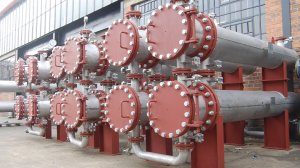Heat exchanger company Protherm Systems is planning to host its first heat exchanger training course in the coming months, in Gauteng, once the Covid-19 national lockdown has been lifted.
The specific date and venue will be communicated to all interested parties and on Protherm System’s website as the situation surrounding the lockdown develops.
The one-day course is aimed at educating plant, mechanical, process and design engineers in the proper selection, application and maintenance of heat exchangers.
“There is a need for the market to be better educated on heat exchangers. We believe that better education on this technology will lead to quicker solution-finding between suppliers and clients,” says Protherm Systems director Dr Leon Koekemoer.
He explains to Engineering News that another key reason for Protherm Systems offering the course is to promote recognition of the company’s brand and the solutions that it offers.
“We do not offer the kind of equipment where clients buy off-the-shelf serial-numbered products from a catalogue. The kind of industrial-level heat exchanger work we do is tailored to the specific requirements of unique projects.”
Koekemoer says the company often finds that it needs to educate clients on the various potential heat exchanger solutions available at the outset of engagements. This slows down the solution-finding process.
He adds that clients often do not know what solutions are available or how to tackle heat transfer challenges.
“It’s a major challenge in the market that we have identified.”
The understanding of heat transfer theory is crucial to almost all engineers. Although the theory is well taught at universities, many engineers do not graduate with the ability to solve heat transfer problems in practice because the bridge between theory and practical application is not adequately addressed, Koekemoer explains.
“This knowledge is essential for engineers who are at the forefront in the design, operation and maintenance of heat exchangers,” Koekemoer notes.
Heat exchangers are commonly used in mining, steel and chemicals, as well as the pulp and paper, industries to transfer energy from one fluid to another. They are particularly useful in the mining and chemicals industries, especially where direct heating and electrical heating are not permitted, owing to the potential for explosions and the presence of volatile gases.
Three types of heat exchangers commonly used include shell and tube heat exchangers, plate heat exchangers, and finned tubes or cross-flow heat exchangers. All three types will be discussed as part of the course.
Moreover, the fundamentals of heat transfer covered in the course will go beyond the conductive heat transfer theory to include convective and radiant heat transfer principles.
“However, heat transfer as a subject is wide and vast; therefore, it is not possible to cover every heat exchanger configuration or subject in a day,” Koekemoer says.
Rather, the emphasis of the course is more on the sizing, operation and maintenance of gasketed plate heat exchangers, shell and tube heat exchangers, and cross-flow heat exchangers, besides others.
“Since the course is aimed at maintenance engineers as well, a session is devoted to correctly specifying heat exchangers and how to evaluate different designs that may be offered to them during the tender phase,” Koekemoer concludes.
Edited by: Zandile Mavuso
Creamer Media Senior Deputy Editor: Features
EMAIL THIS ARTICLE SAVE THIS ARTICLE
ARTICLE ENQUIRY
To subscribe email subscriptions@creamermedia.co.za or click here
To advertise email advertising@creamermedia.co.za or click here













